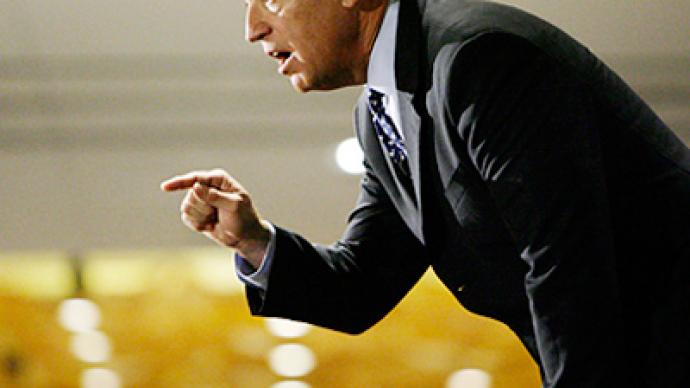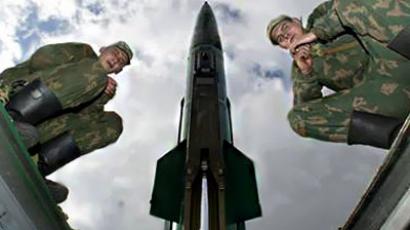No need to “institutionalize” US-Russian summits – Joe Biden

Saying that major summits have gone the way of the hammer and sickle, US Vice President Joe Biden is arguing for regular interaction and communication between Moscow and Washington.
Kicking off a three-day Russian visit, US Vice President Joe Biden told Russian media that Moscow and Washington should not wait for major summits to hammer out bilateral objectives, but rather work everyday towards a solid friendship."To be honest, I am not sure that ‘summits’ need to be institutionalized in this day and age,” Biden, the man who first promoted a “reset” between Russia and the United States, told Itar-Tass on Wednesday. “To me, that harkens back to the Cold War era.”Instead, Biden envisions an atmosphere of “frequent interaction and communication between our two presidents – and at all levels of our government” in order to achieve positive results.The US vice president then mentioned the strong relationship that exists between the American and Russian presidents that was achieved “without all of the protocol and formalities.”"Over the last two years, President Obama and President Medvedev have met numerous times, not only in Moscow in 2009 and Washington in 2010, but at the major international meetings that they both attend," Biden said. "They have established a very strong and close personal relationship, without all of the protocol and formalities, which has helped them work together to achieve concrete goals that benefit the American and Russian people. “Biden added that Medvedev and Obama will meet each other in May at the G8 meeting, as well as another time “later in the year.”Moscow is anticipating an official announcement of Obama’s visit to Russia during Biden’s trip.Will missile defense scuttle Biden’s visit?Although the Kremlin has said the purpose of Biden’s visit will not be to nitpick over missile defense, it will certainly be the elephant in the room.In response to the question, “If there was just one other issue in our bilateral relations, aside from the WTO, which we could resolve before the end of the year, what would you choose?" Biden responded that Washington would like to resolve all missile defense issues with Russia before the end of 2011."Missile defense,” he immediately replied. “Both together and within the NATO-Russia Council, we are pushing hard to develop a work plan for cooperation on missile defense. That's the best way to build trust and strategic stability between our two countries.”Both Russia and the United States can “take advantage of our unique, complementary ballistic missile defense capabilities” to better protect the region from a rogue missile attack, ostensibly from Iran, Biden said.He added that both sides are trying to resolve the question of co-operation on missile defense, both bilaterally and in the framework of the NATO-Russia Council, which is the best way of establishing “trust and strategic stability between our two countries.” Washington’s insistence of building the missile defense system, which Russia says will compromise its national security, remains a thorn of contention between Moscow and Washington. The US missile defense system was first unveiled by the George W. Bush administration to considerable public opposition in Poland and the Czech Republic, the two former Warsaw Pact nations that were invited to host the system (The Washington Post revealed back in April 2007 that 57 per cent of Poles opposed the plan, while 68 per cent of Czechs were against it). Indeed, more than 130,000 Czechs signed a petition for a referendum about the proposed US base, which is by far the biggest citizen initiative in the country since the Velvet Revolution.Despite Europe’s (public) opposition to the plan, US President Barack Obama, possibly not wanting to appear weak in the face of the hawkish Republicans, “shelved” the Bush plan, only to reveal a new system. Russia, however, remains convinced the program poses a direct threat to its security, and is pushing for full co-operation in all stages of the program. Thus far that has not happened.The Pentagon announced last week that the USS Monterey, a guided missile cruiser equipped with a sophisticated Aegis radar system, is preparing for a six-month deployment in the Mediterranean, the first phase in the unfolding missile defense system.The missile shield will begin with ship-based anti-missile interceptors and radars, with land-based radars added in southern Europe later this year. The next phase of the missile shield will see land-based interceptors deployed in Romania in 2015, followed by interceptor batteries in Poland by 2018. The Pentagon has still not disclosed the exact location of those radars, which ironically makes the “Obama system” appear even more threatening than the Bush proposal. “At least the Bush administration was up front about what they were proposing,” said one senior Russia diplomat who spoke on condition of anonymity due to his proximity to the talks. “The Obama administration has not come clean with their plans, nor are they living up to the promise of co-operating with us.”The diplomat added that the “contrariness” of the Obama administration is frustrating the Russian side.In November, Russian President Dmitry Medvedev secured a pledge from NATO top brass that the Western military bloc would work together with Russia in the developmental and operational stages of the system. Last week the Russian president stressed Moscow’s willingness for cooperation in the system."We should go ahead with our plans for reducing strategic arms as well as in the field of missile defense,” Medvedev told Russian media. “Since a missile defense shield may be an element of the strategic nuclear arsenal, Russia wants security guarantees. We`ve unveiled our proposals and are ready for co-operation."WTO Accession Meanwhile, the White House thinks that Russia has a chance to enter into the World Trade Organization (WTO) in 2011, but "it will take work," Biden said in comments to Itar-Tass."Your government has targeted 2011 for Russia's accession to the WTO,” the US vice president noted. “We support that effort. Of course, the United States is just one of 153 Members of the WTO with which Russia must reach agreement to join. If the Russian government shows the same determination and seriousness of purpose it did in our negotiations, I have no doubt it will join the WTO on schedule. But it will take work," he said.Biden should have added that it will also take work on the American side to bring Russia on board the WTO. After all, the United States has still not repealed the Jackson-Vanik Amendment, which is a Soviet-era piece of legislation that attempted to punish the Soviet Union for imposing a tax on emigrants, mostly Jews, in an effort to recover expenses for their education received while subjects of the Soviet Union.Jackson-Vanik has been in force since 1974, and to this day hinders Russia’s normal trade relations. Critics, meanwhile, say the amendment is counterproductive trade discrimination, but particular US-based groups, particularly the Anti-Defamation League (ADL), which works on behalf of Jewish Americans, fights to keep the amendment alive.According to Itar-Tass, Biden evaded an answer to the question, "Can we expect you to play a leading role (or, maybe, the leading role) at the White House in working with the Congress on the [Jackson-Vanik] issue?"Instead, the US vice president said he would focus on trade and economic affairs during his visit to Moscow and affirmed "real progress on our economic relationship.""We've worked through trade disputes and we are working with US and Russian companies to create closer ties, promote innovation, and establish the conditions to attract foreign investment in Russia beyond the natural resources sector,” Biden noted. “But I still see a lot of untapped potential, which is why I want to explore new ideas for enhancing trade and investment between our two countries.As far as the much-publicized “reset” in relations between the two former Cold War superpowers, Biden asserts this is a top priority."The reset in US-Russian relations has been a top priority for President Obama and me,” he said. “[President Barack Obama] asked me to travel to Moscow to build on the important progress our two countries have achieved these past two years. With President Medvedev and Prime Minister Putin I expect to discuss the many areas where Russia and the United States are working closely together, including arms control and non-proliferation, Central and Southeast Asia, and European Security, to name just a few," Biden said.The American vice president, mentioning the recent global financial crisis that continues to dampen the domestic climate in the US, then discussed the need for both countries to approach economic projects. "One area I hope to focus on is our economic ties," he said. "With the world economy recovering from a painful crisis, we need to explore ways to realize the full potential of our relationship and to generate more trade and investment. That will benefit Russians and Americans alike. That's why I will be hosting a roundtable discussion with US and Russian business leaders, and visiting Skolkovo [a new research and development center on the outskirts of Moscow that models itself as the “Russian Silicon Valley].Asked what in the reset concept needs to be improved, Biden mentioned the joint achievements of the United States and Russia, among them New START, co-operation in Iran, Afghanistan and North Korea, and the improvement of security in Europe.In conclusion, Biden stressed that the Russians and the Americans need more trust to work through their misunderstandings. One way to accomplish this, he suggested, is more frequent contacts between both sides."I think our biggest challenge remains getting over Cold War assumptions about Russian and American motivations in the world,” he said. “The more contact Russians and Americans have with each other, the more quickly these outdated assumptions will end.”Robert Bridge, RT














